Sam Vinograd, an Obama administration national security alumnus – and now, needless to say, a CNN nat sec analyst – is hearing things:
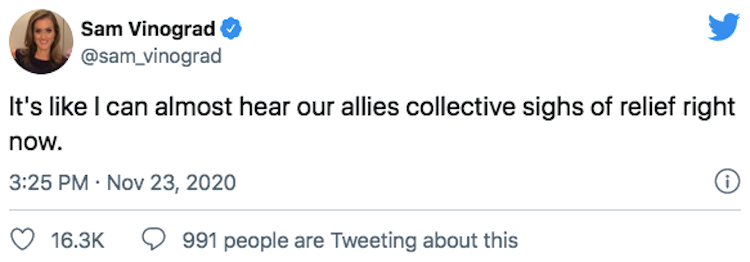 She’s not alone; both the mainstream and the social media are full of political establishment types rejoicing that the Biden administration will return things to “normal”, including in the area of international affairs. Trump was certainly an unorthodox foreign policy operator, and his legions of critics have had a field day – or, rather, field four years, of decrying the President “trashing the norms”, destroying the alliances, and leaving America isolated and friendless in the world.
She’s not alone; both the mainstream and the social media are full of political establishment types rejoicing that the Biden administration will return things to “normal”, including in the area of international affairs. Trump was certainly an unorthodox foreign policy operator, and his legions of critics have had a field day – or, rather, field four years, of decrying the President “trashing the norms”, destroying the alliances, and leaving America isolated and friendless in the world.
Of course, if you’re old enough and have memory better than a media-trained goldfish, you will recall the same accusation being levied at George W Bush over the invasion of Iraq. “W” has now been rehabilitated by the left as a “good Republican”, because he is no longer a political threat, but the narrative lives on. And so now, with a Democrat in the White House come January 2021, “our allies” can rejoice that the after the long nightmare of Trumpism the “old America” is back.
But which allies are these?
Living in Australia, my view nowadays tends to more Asia-Pacific-centric, so let’s start with this region. Whatever else you can say about Trump’s foreign policy, his tough stance vis-à-vis China, whether in trade, in security, or general geo-political realm, has been very popular throughout east and south Asia, where China’s growing power and ambitions have been a source of intense and immediate concern for quite some time now. Some of China’s major neighbours have been America’s long-standing allies, others more recent friends, but from India, through Singapore, Vietnam, Taiwan, Philippines, to Japan and South Korea – and further away in Australia – governments have been very welcoming of a more realistic American policy towards the authoritarian hegemon. In some of those countries, in addition to the government/elite approval, Trump’s foreign policy remains very popular among the general population – 56 to 15 per cent in India and 77 to 19 per cent in the Philippines, for example. India, as the cliché goes, is the world’s largest democracy, soon to overtake China in population, and as good a candidate as many to help diversify America’s (and the West’s) supply chains from the unreliable and unfriendly China. Post-1947 Indian has been at best ambiguous towards the United States; now, thanks to China’s noisy rise, it’s a solid future ally for the picking. As a former British colony, much of its political culture and institutional framework is quite familiar.
Maybe my hearing is not as good as Sam’s (I am much older than her – and certainly not an expert like she is), but I’m straining to hear any sighs of relief throughout Asia about Joe Biden, whose family remains compromised by their commercial dealings with China, and who himself plans to return to the standard operating procedure in dealing with the Middle Kingdom. Biden is Beijing’s choice – business-as-usual and weak. What Xi thinks of President Harris one can only guess.
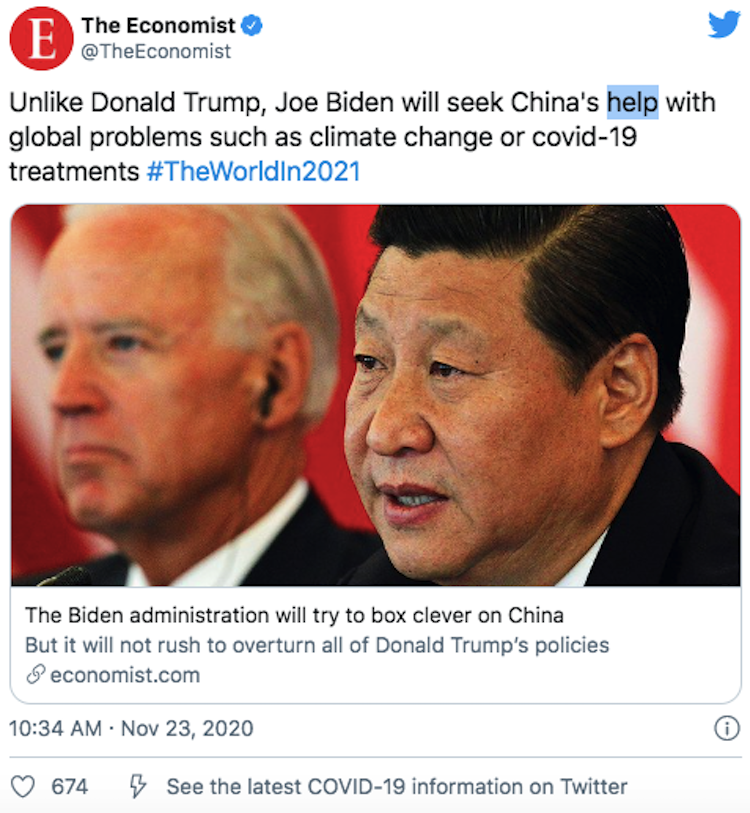 What about the Middle East? Israel is the only strong and consistent American ally in the region. Trump has been arguably the most pro-Israel president in living memory and Israelis, in turn, are wild about Donald, by a 71 to 29 per cent margin. The general Arab populace tends to be strongly anti-American, and the elites fair-weather friends, but it’s safe to say that Sunni states like Egypt, Saudi Arabia and other Gulf kingdoms have been very much onboard the Trump Train, in as much Trump has no dangerous illusions about Iran. The growing peace between Israel and its long-standing regional enemies is one example of the shared concern about the Mad Mullahs of Teheran overriding all other historical considerations and conflicts. Biden, on the other hand, is committed to restoring the Obama diplomatic legacy of the “Iran deal”, despite Iranian cheating and continuing hostile behaviour. Like a second marriage, for Democrats this is a triumph of hope over experience. It might be audacious but it’s going to leave the overwhelming Sunni majority in the region even more unsettled.
What about the Middle East? Israel is the only strong and consistent American ally in the region. Trump has been arguably the most pro-Israel president in living memory and Israelis, in turn, are wild about Donald, by a 71 to 29 per cent margin. The general Arab populace tends to be strongly anti-American, and the elites fair-weather friends, but it’s safe to say that Sunni states like Egypt, Saudi Arabia and other Gulf kingdoms have been very much onboard the Trump Train, in as much Trump has no dangerous illusions about Iran. The growing peace between Israel and its long-standing regional enemies is one example of the shared concern about the Mad Mullahs of Teheran overriding all other historical considerations and conflicts. Biden, on the other hand, is committed to restoring the Obama diplomatic legacy of the “Iran deal”, despite Iranian cheating and continuing hostile behaviour. Like a second marriage, for Democrats this is a triumph of hope over experience. It might be audacious but it’s going to leave the overwhelming Sunni majority in the region even more unsettled.
Europe is arguably where Vinograd & Co think of when they talk about allies. But what is Europe? Great Britain has been the most important, if off-shore, friend in the Old World, and it’s difficult to see the current Tory government happier with a Democrat than a Republican administration. At the other end of Europe, Trump remains popular in the big regional players like Poland (51 to 39 per cent) and Ukraine (44 to 37 per cent), and the favourite of the governing elites of many other Eastern European states. This is ironic, of course, because Trump, supposedly a Russian agent or at best Putin’s lackey, is most popular in those European countries that are on the very frontline of the new cold war with Russia. Trump’s actual actions and words clearly speak louder than left-wing conspiracy theories.
It’s true that Biden will be much more welcome in Germany and France and other parts of western Europe. Congratulation, if you think that the main object of the American foreign policy is to make Belgians happy. The NATO countries will certainly be happy since, unlike Trump, Biden is not going to spoil the friendship and the alliance by reminding Europeans that as friends and allies they should actually be pulling their weight. It’s meant to be common defence, not free-loading off America’s military might. With only a handful of member states (Poland, UK, Greece and Estonia) meeting their “2 per cent of GDP” defence spending target, NATO is an alliance in name only, a collection of free-riders outsourcing their security to the United States, while splashing cash on their own welfare states.
As an aside, Africa does not instantly spring to mind when thinking of America’s allies – but it should. The continent continues to grow both in population and in prosperity (faster than Asia in the former, slower in the latter), and Trump has been quite popular in Africa too.
All in all, when Democrats talk about allies they seem to think of their own international equivalents, of which there are many, particularly among the feckless Europeans. The European Union loves the Democrat America – worshipping multilateralism for its own sake, in thrall to the “international community”, and focused on climate change and global justice rather than communists, terrorists and rogue states (how unsophisticated!). It’s the return of America the Impotent or America as Another Europe. They will sign yet more important-sounding international agreements and treaties, and join the international choir of virtue signalling; all very post-national and post-modern – and as effective as ever.
The sigh that Vinograd is hearing is coming loud and clear from the cafes of Copenhagen and Madrid, the meeting rooms at Davos, and trendy salons of conventional wisdom scattered across the capitals of the developed world. Things are back to normal and America can resume its equal place at the table discussing and shaping the bright future of decarbonisation, the Great Reset, and its managed decline.* With allies like that who needs enemies?
* Biden’s UN ambassador Linda Thomas-Greenfield: “U.S. diplomacy has to accept the country’s diminished, but still pivotal, role in global affairs. It has to apply greater restraint and discipline; it must develop a greater awareness of the United States’ position and more humility about the wilting power of the American example.”
Arthur Chrenkoff blogs at The Daily Chrenk, where a version of this piece also appears.
Got something to add? Join the discussion and comment below.
Get 10 issues for just $10
Subscribe to The Spectator Australia today for the next 10 magazine issues, plus full online access, for just $10.

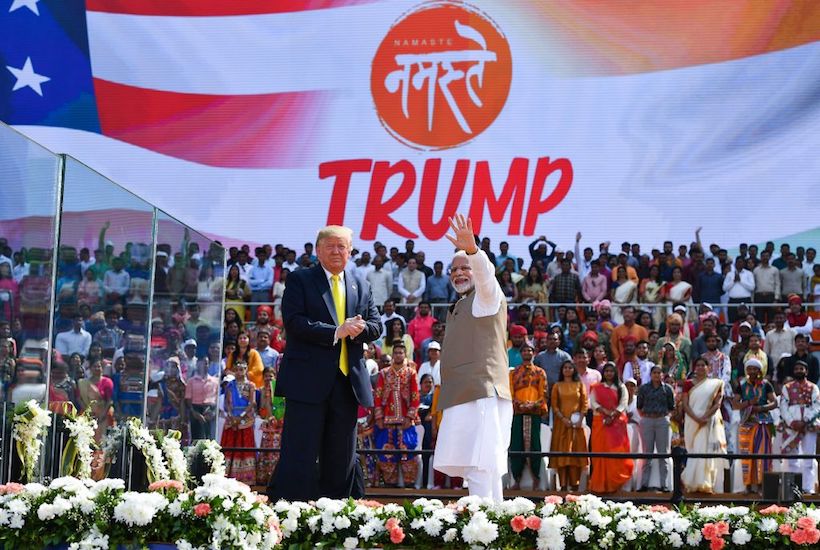
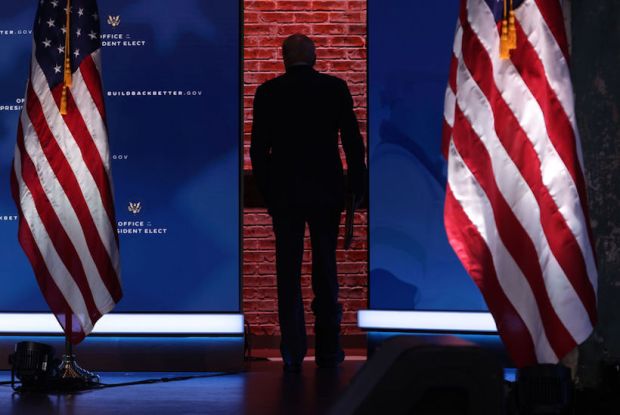
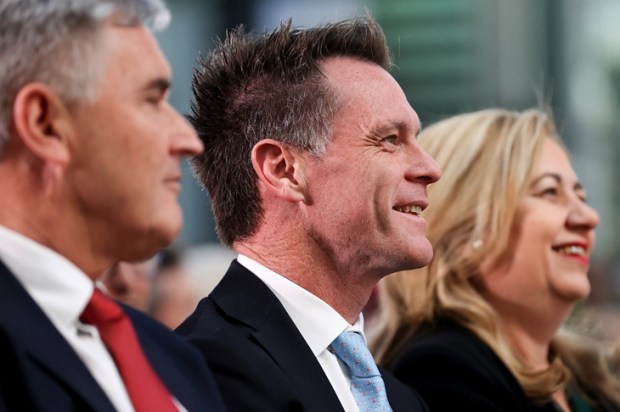
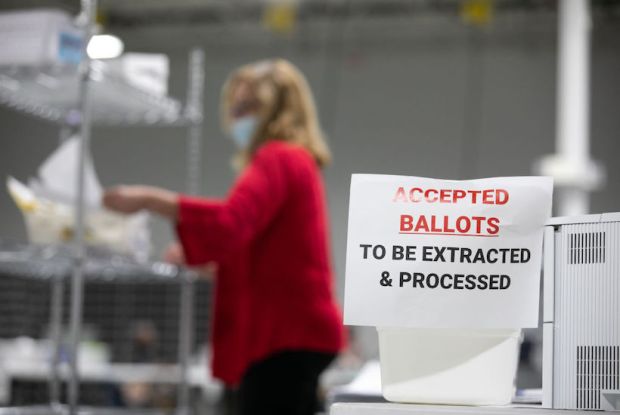

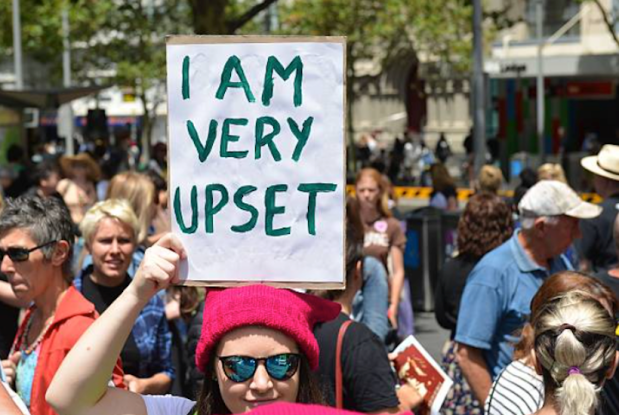












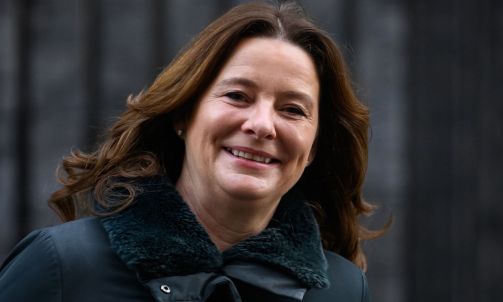






Comments
Don't miss out
Join the conversation with other Spectator Australia readers. Subscribe to leave a comment.
SUBSCRIBEAlready a subscriber? Log in